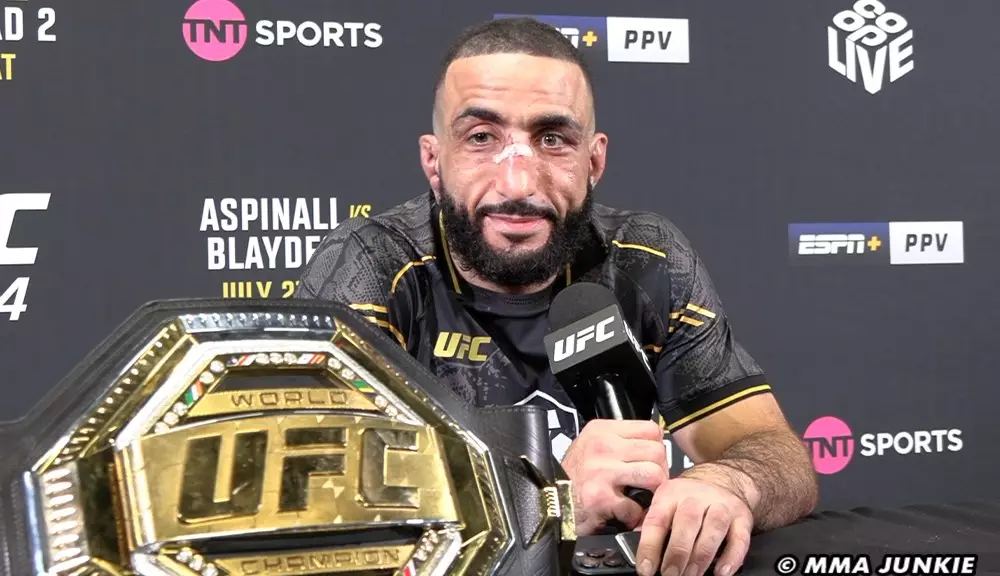The world of mixed martial arts, particularly in the UFC, is an arena of dynamic challenges and evolving circumstances. Recently, a notable incident involving UFC welterweight champion Belal Muhammad and contender Shavkat Rakhmonov has highlighted the complexities surrounding interim title fights. The championship landscape is not merely about the belts; it intertwines personal circumstances, promotional strategies, and the athletic commitments of fighters.
Belal Muhammad, who holds a professional MMA record of 24 wins and 3 losses, found himself in a situation unexpected for a champion. Scheduled to defend his welterweight title for the first time at UFC 310 against the undefeated Rakhmonov, Muhammad faced a significant medical setback when a toe infection necessitated immediate surgery. This unfortunate turn of events not only sidelined him from an anticipated clash but also prompted questions regarding the future of the title and how the UFC would navigate this gap in their schedule.
Muhammad expressed his initial desire to avoid further delays in action. His quick recovery prognosis from a physician provided some relief, yet the wider implications for the welterweight division were looming. The urgency for the UFC to maintain momentum in the championship landscape cannot be understated, as every canceled fight has ripple effects through fight cards and fighter rankings alike.
While Muhammad recuperates, Shavkat Rakhmonov championed the notion of holding an interim title fight. The undefeated contender, boasting an impressive record of 18-0, looks to seize opportunities even in the wake of his opponent’s injury. However, Muhammad’s reaction to Rakhmonov’s proposal was one of skepticism due to the timeline of his recovery. He articulately argued that waiting just six weeks should not warrant the need for an interim title, as it diverges from traditional practices that typically involve longer absences.
This call for an interim championship highlights a growing trend in combat sports, where fighters often push for title opportunities in shortened timeframes. While this could be seen as an admirable desire to stay competitive, it raises questions about the legitimacy and integrity of the championship titles. Muhammad underscored that he knows who truly holds the title — himself — hence seeing little value in interim belts when his absence is temporary.
Despite recognizing the potential benefits of an interim title fight, Muhammad articulated concerns regarding the availability of worthy opponents. The welterweight division is filled with talented fighters, but many who could step up have prior engagements. Ian Machado Garry and Joaquin Buckley, both relevant names for a potential replacement fight, are already slated to face off in another bout. Furthermore, the dynamic involving former champion Kamaru Usman adds another layer of complexity, as he and Rakhmonov train together, complicating the notion of them competing against each other.
Additionally, the idea of pursuing fighters from outside the welterweight division to fill the void for UFC 310 presents its own challenges. While UFC light heavyweight champion Alex Pereira and Magomed Ankalaev have expressed interest in a possible bout, diverting from the intended weight class could erode the integrity of the event and its alignment with title implications.
Belal Muhammad’s candid reflections during interviews shed light on not just his personal journey but the broader implications of how events unfold in the UFC. The promotion’s decision-making hinges on adequately addressing injuries, athlete readiness, and fan interests. Strategic choices in matchmaking are not merely about filling slots; they require anticipation of potential ramifications for career trajectories and title landscapes.
As the UFC navigates through these multifaceted discussions, keeping the welfare and aspirations of fighters in perspective will be crucial. With impending decisions on who will step into the main event of UFC 310, the organization must strike a balance between maintaining competitive integrity and satisfying the fighters’ desires for action. The road ahead is complex, but for champions like Muhammad and contenders like Rakhmonov, clarity in title pursuits and fights is paramount for their careers and the sport’s evolution.

